You can see Messi, Suarez and other South American superstars play in the Copa America.
Why then are soccer fans ignoring the oldest football tournament and looking forward to the European championships, which begins in France on Friday?
Norma Godinho/Rediff.com has the answers.
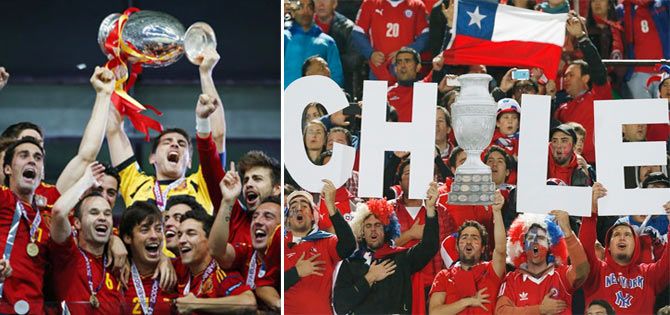
The summer of international football is at its peak and fans are only happy to get scorched.
With two continental tournaments kicking off a week apart, soccer romantics could just go giddy with all the action on their television sets.
So while some football fanatics ignore all the distractions and dive into bed to catch the Copa America (the telecast of the matches start post midnight in India), it's the Euro 2016 championships that soccer geeks are looking forward to with bathed breath.
It's one of those rare times when two international mega football events are being held simultaneously, well almost.
There are a few things that need to be spelt out about these mega continental tournaments.
Even though the Copa America, being played in the United States, is celebrating its centenary year, (2016 Copa America Centenario) there are only a few takers.
Compare that to the France-hosted Euro.
It is clearly evident (check your Twitter and Facebook feeds) that it is THE tournament that holds the key to satiating the needs of the global football-crazy audience.
So what is it that truly separates both these tournaments?
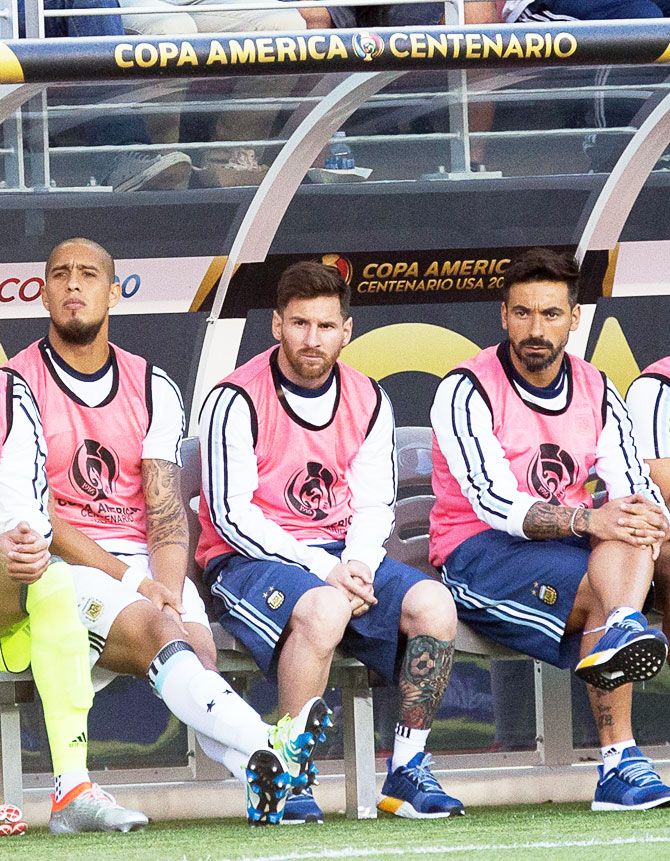
Messi was out of the match because of a back injury. Photograph: Kelley L Cox-USA TODAY Sports via Reuters
The Copa America has its share of football heroes. There's FC Barcelona's Lionel Messi playing for the Albiceleste, his club teammate Luis Suarez wearing the Uruaguyan jersey along with Atletico Madrid captain Diego Godin and Arsenal forward Alexis Sanchez, who lead last year's Copa champions Chile.
Brazil also bears the big names: Dani Alves (Barca), Phillippe Coutinho (Liverpool FC), Hulk (Zenit).
There are other recognisable names who don their studs for European soccer clubs and play for CONMEBOL teams. In sum, there is no dearth of big stars in the American continental football tournament.
But only poster boys do not a tournament make!
For an event like the Copa America, the oldest football tournament in the world -- it is even older than the World Cup -- there is a huge history attached to it.
Formerly known as the South American football championship, it was one of the biggest football tournaments of the time. However, over decades, enmity among associations of the CONMEBOL saw the tournament lose its importance.
A confederation of the associations of Argentina, Brazil, Chile and Uruguay got together and founded the CONMEBOL, and were joined later by Paraguay, Bolivia and Peru.
Over time, members of the CONMEBOL took the tournament lightly, so much so that it was not held for eight years (1967 to 1975).
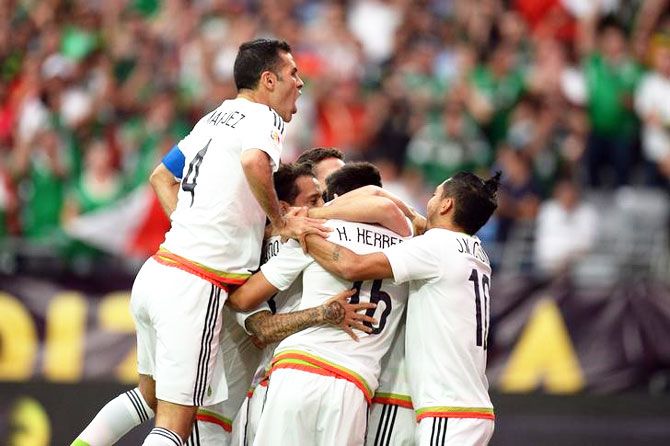
Since its revival in 1975, it is being played in its current format -- every two, three or four years -- and includes two invitee teams, preferably from the CONCACAF, this time the United States and Mexico.
With commercialisation of the sport over the years and lack of star-producing capability it has lost its sheen.
Nothing has brought the Copa America as much disrepute as a recent claim that the centenary tournament-hosting rights were given to the US following murky dealings by Jeffrey Webb, a former FIFA official (chief of the Confederation of North, Central America and Caribbean Association Football, CONCACAF), under investigation for corruption.
On Tuesday, June 7, days after the commencement of the Centenary Copa America, Wilmar Valdez, the head of Uruguay's football association, declared that it was a mistake to play the Centenary Copa America in the United States.
Valdez told the Uruguayan radio station Sport 890 that the South American Football Confederation, CONMEBOL, should not have chosen the US to host the 100th anniversary of the world's oldest continental competition, first played in Buenos Aires in 1916.
The tournament has been boosted to a 16-team format for the first time with the inclusion of six teams from CONCACAF, which governs soccer in North and Central America and the Caribbean.
'CONMEBOL got it wrong,' Valdez said.
'It erred in celebrating a tournament like this, the oldest in the world, South American football, here in the United States where it became very clear that it is arranged for Mexico,' Valdez alleged.
As one CONMEBOL official behind the hosting decision, Valdez admitted he shared responsibility for the 'mistake.'
How then did a country like the US, that made FOOTBALL into SOCCER and, in Valdez's own words, lacks passion for the sport win the hosting rights for a tournament of this stature?
Hindsight forces us to ask these questions, but probe deeper and the real questions beg to be answered.
Did those reports that made the corruption claims behind the US winning hosting rights hold any water?
South America is the soul of world football and if the soul is mucked up, that says a lot.
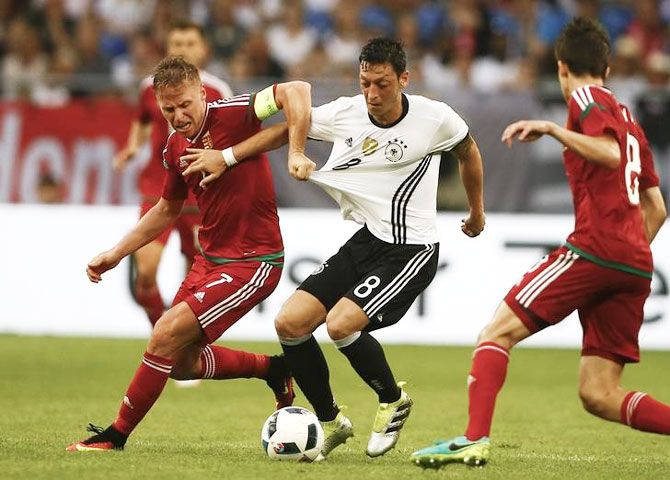
Ozil is pivotal to Germany's success and there are high expectations of him to help the World champs do a double with a Euro title this year. Photograph: Wofgang Rattay/Reuters
Compare that to the UEFA, the football body responsible for overseeing the well-being of soccer in Europe.
UEFA too was embroiled in a corruption scam. Former French captain Michel Platini, who till recently headed UEFA, was forced to resign as its president after his appeal against a six-year ban from football was rejected by the Court of Arbitration for Sport.
Platini was banished along with former FIFA president Sepp Blatter over a payment of two million Swiss francs ($2.08 million) made to the Frenchman by FIFA with Blatter's approval in 2011 for work done a decade earlier.
UEFA has weathered the storm and is now prepared to flag off Euro 2016.
The quadrennial event features some of the biggest names in Europe -- Cristiano Ronaldo, Zlatan Ibrahimovic, Thomas Mueller, Bastian Schweinsteiger, Robert Lewandowski, Paul Pogba, Wayne Rooney, Antoine Griezmann, Mesut Ozil, Gianluigi Buffon, Jordi Alba... the list can be stretched a lot longer than the word count allows -- who will swap club jerseys for national team uniforms, forget friendships forged in club football and dazzle viewers with their fancy footwork.
Even though it was started nearly half a century (the first tournament played in 1958) after the Copa America, the European Championships has become a tournament of great stature.
It nearly does work as a rough sketch of what to expect (more or less) from the World Cup two years later and invariably produces a star or two who goes on to sign and/or shine in club football.
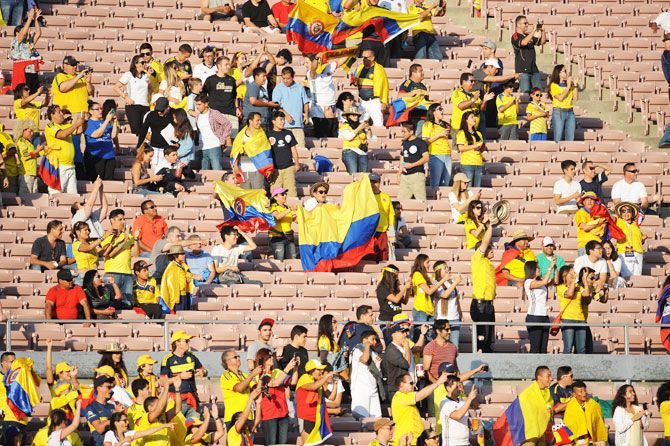
Reports have suggested that the US-hosted tournament is not drawing too many fans to the stadia. Photograph: Gary A Vasquez-USA TODAY Sports/Reuters
Unlike the Copa which invites teams from the CONCACAF, the Euro plays fair with a proper qualifying process and play-offs over an 18-month period to pick the final list of teams. This year's tournament, for the first time, will feature 24 nations.
This 'fair play' means a top team like The Netherlands was unable to qualify for the 2016 tournament, while teams like Northern Ireland made their efforts count to win a berth.
It is a tournament that has worked with clockwork precision. From an eight-team tournament to what it is today, the Euro has maintained its reputation, ensuring that the competition is held without a hitch.
The European Championships involve massive marketing and television rights as opposed to the Copa.
Held every four years, it ropes in big sponsors and the prize money is also a lot bigger -- this year the European champions will pocket 8 million Euros ($9 million/about Rs 57 crores/Rs 570 million) as opposed to the Copa winner, which will earn $6.5 million (about Rs 39 crores/Rs 39 million).
Compare that to the Copa America.
The US is hosting the Copa for the first time and the tournament is yet to catch the fancy of spectators, with sparse crowds at the games.
Even the matches are dull and boring, something you wouldn't expect at the Euro -- we have seen smaller teams upset the big fish in the warm-ups.
The fact that there's no clear favourite to win the competition only proves why the Euro will always score over the Copa America.









